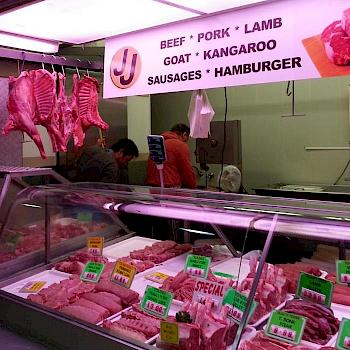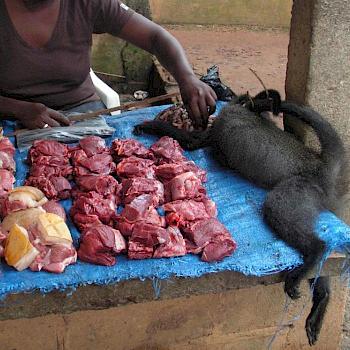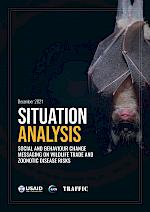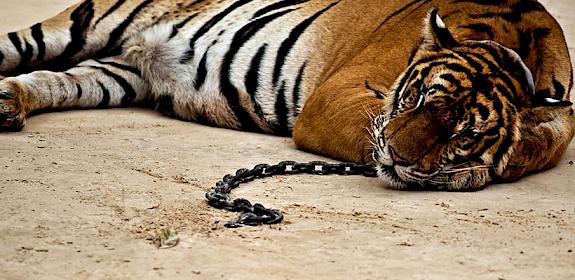Notes:
This Review reiterates the interim international guidance in response to the COVID pandemic published in April 2021 by the World Health Organization, the World Organisation for Animal Health, and the United Nations Environment Programme, that trade in wild animals requires risk assessment and effective regulations, including traceability as an important control measure.
The Review’s case studies were prepared by Resilient Conservation at Griffith University’s Centre for Planetary Health and Food Security, in collaboration with TRAFFIC.
Notes on webinar:
Lead author and Wildlife TRAPS Officer, Sam Campbell discussed the findings of this review with a panel of experts, including:
- Dr Hernan Caceres-Escobar, post-Doctoral Researcher at Sapienza University of Rome
A veterinarian with a PhD in Conservation Science, Hernan has also pursued postgraduate studies in business management, economics, and project assessment. Following the onset of the SARS-CoV-2 pandemic, he worked with Dr Richard Kock of the IUCN Wildlife Health Specialist Group to lead a Situation Analysis On the Roles and Risks of Wildlife in the Emergence of Human Infectious Diseases for the IUCN Species Survival Commission, which was published in February 2022.
Currently, Hernan is exploring how biodiversity conservation and ecosystem disturbance impact human health, with a goal is to aid decision-makers maximise environmental and socio-economic benefits. The use of transdisciplinary participatory approaches and modelling techniques is fundamental to develop innovative evidence-based interventions and policies. - Qudra Kagembe, Project Officer and Wildlife TRAPS focal point for East Africa, TRAFFIC
Qudra Kagembe provides technical support to different projects including, wildlife trade data collection and analysis, strengthening law enforcement capacity in combating IWT, particularly in the maritime supply chains, airports, and land border points in East Africa. He is also currently working on Tanzania’s legal game meat supply chains.
Before joining TRAFFIC, Qudra worked as a field researcher, largely focusing on bird ecology and habitat fragmentation. Qudra is an expert on bird biology and has a Degree in Wildlife Science and Conservation from the University of Dar es Salaam in Tanzania. Qudra is based in Arusha, Tanzania. - Karlina Indraswari – University of Queensland
Karlina Indraswari is originally from Indonesia and is passionate about finding solutions to conservation issues. Karlina’s research focuses on using trans-disciplinary approaches to solve wildlife conservation issues. Karlina acquired her PhD from Queensland University of Technology, where she used a multi-faceted approach to assess the efficacy market-based approach to solve Indonesia’s songbird trade crisis.
Karlina is currently a post-doctoral researcher at the University of Queensland. After working with TRAFFIC on Options to Manage and Trace Wild Animal Trade Chains, she is now developing a metric to measure bird populations in Australia. On the side, she is also working on a project to understand Indonesia’s perception of the spread of zoonotic disease through its pet bird trade. - Dr Taye Teferi - Policy & Partnership Coordinator - Africa, TRAFFIC
Dr Taye Teferi has over 30 years’ experience in natural resource management and is currently the Africa Policy and Partnerships Manager for TRAFFIC. Dr Teferi has had wide international experience, working closely with local communities, government agencies, development partners, regional bodies, NGOs, and private institutions across Africa, North America, Europe, and Asia, focusing on understanding the particular capabilities, needs and requirements of these stakeholders. He has led the implementation of large regional, multi-stakeholder programmes and has provided leadership and technical advice/expertise in a number of Multi-lateral Environmental Agreement (MEA) negotiations and sustainable development fora.
Watch above or click here to open in a new tab
About Wildlife TRAPS
The Wildlife TRAPS Project, implemented by TRAFFIC and IUCN with funding support from USAID, is helping to forge cross-sectoral partnerships with government and experts in inter-governmental organisations, NGOs, academia, and the private sector to identify risk mitigation strategies to prevent future zoonotic spillover potential associated with trade in wild animals.
As well as strengthening supply chain management systems and traceability, the Wildlife TRAPS project is implementing social and behavioural change interventions and supporting policy and regulatory reform efforts. The identification of critical control points within wildlife trade supply chains will help target illicit and other high-risk wildlife trade practices that may facilitate the transmission of zoonotic diseases.
About IUCN

The International Union for Conservation of Nature (IUCN) is a membership Union uniquely composed of both government and civil society organisations. It provides public, private and non-governmental organisations with the knowledge and tools that enable human progress, economic development and nature conservation to take place together. For more information visit: iucn.org
About USAID

The United States Agency for International Development (USAID) is responsible for the majority of overseas development assistance from the United States Government and works to end extreme poverty and promote resilient, democratic societies while advancing security and prosperity for America and the world. www.usaid.gov/


 Adapting existing food safety protocols to identify hazards and manage disease risks associated with wildlife trade could be a practical approach to preventing future zoonotic spillover events at a variety of human-animal interfaces.
Adapting existing food safety protocols to identify hazards and manage disease risks associated with wildlife trade could be a practical approach to preventing future zoonotic spillover events at a variety of human-animal interfaces. Currently, monitoring for health risks mainly focuses on food safety concerns like contamination and spoilage, but in domestic and wild animal supply chains, there is a growing need to ensure the trade in wild animals carries minimal risk of emerging infectious diseases (EIDs). Traceability systems would enable a better understanding of a wildlife trade supply chain by monitoring critical points to gather data on where, how, and under what regulatory conditions a product – whether live, partly processed, or as parts and derivatives – was sourced, prepared and transported towards the end-user.
Currently, monitoring for health risks mainly focuses on food safety concerns like contamination and spoilage, but in domestic and wild animal supply chains, there is a growing need to ensure the trade in wild animals carries minimal risk of emerging infectious diseases (EIDs). Traceability systems would enable a better understanding of a wildlife trade supply chain by monitoring critical points to gather data on where, how, and under what regulatory conditions a product – whether live, partly processed, or as parts and derivatives – was sourced, prepared and transported towards the end-user.


